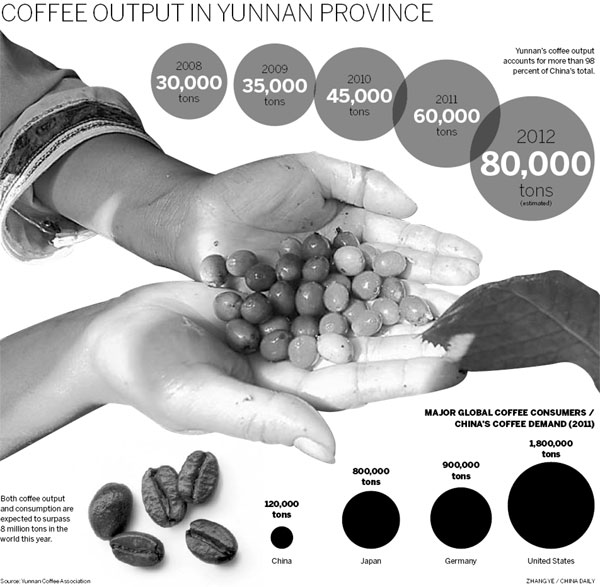Wake up and smell the Chinese coffee
Updated: 2012-11-26 10:36
By Xie Yu in Shanghai and Guo Anfei in Pu'er, Yunnan (China Daily)
|
||||||||
Coffee beans from Kenya or Jamaica are much more famous, but it takes at least one month for them to pass through China's customs. Now that Yunnan also produces good quality Arabica coffee beans, why not try a cup that is made using freshly roasted coffee beans, he suggested.
|
|
|
A farmer working at the farm owned by AiniCoffee Group, the biggest coffee brand in Yunnan province. The provincial government has set a target to expand the local coffee growing area to 607,000 hectares by 2020. The coffee growing area in Yunnan now exceeds 404,686 hectares, according to the Yunnan Coffee Association. [Photo/China Daily] |
The Yunnan provincial government hammered out a comprehensive plan to develop the coffee industry into a strategic strength last year. It sets a target to expand the growing area to 607,000 hectares by 2020, to realize an annual output of 200,000 tons, estimated at 34 billion yuan.
The coffee growing area in Yunnan now exceeds 404,686 hectares, according to data from the Yunnan Coffee Association.
A total of 50,000 tons of Yunnan coffee beans were sold abroad in 2011. Although it only accounted for 0.6 to 0.7 percent of the global transaction volume, the figure is a record high in the history of the province's coffee exports.
French missionaries brought the first coffee seed to Yunnan in the 1890s and local people have been growing and drinking coffee since then.
Located in Southwest China, the geographic and climatic conditions in Yunnan are similar to those of Indonesia and part of Colombia - two areas famous for high-quality coffee beans. But few people know that China has its locally grown coffee in Yunnan and a coffee brand in the world market.
In Pu'er city, the local Pu'er tea has long been renowned for its unique fragrance and has long had a good reputation globally. However, the city's coffee beans, despite providing a top-level taste, have been virtually unknown elsewhere until now.
"It (coffee) was just a common beverage in our daily lives. We have drunk it since we were children but never thought it could be competitive in the international market," said Pu Na, 26, a Yunnan native.
People here grow coffee as a supplementary crop to corn or potatoes in the past. It was never industrialized, she said.
Yu Zhichang, a 35-year-old female farmer in Pu'er city, said she used to make her living growing potatoes and corn.
She has been planting coffee since 2000 on a small plot. In 2011, she started cooperating with AiniCoffee and expanded the growing area. Yu earned more than 60,000 yuan from coffee, much more than from growing other crops.
"I think I've found the way forward," she said.
Contact the writers at xieyu@chinadaily.com.cn and guoanfei@chinadaily.com.cn


 Relief reaches isolated village
Relief reaches isolated village
 Rainfall poses new threats to quake-hit region
Rainfall poses new threats to quake-hit region
 Funerals begin for Boston bombing victims
Funerals begin for Boston bombing victims
 Quake takeaway from China's Air Force
Quake takeaway from China's Air Force
 Obama celebrates young inventors at science fair
Obama celebrates young inventors at science fair
 Earth Day marked around the world
Earth Day marked around the world
 Volunteer team helping students find sense of normalcy
Volunteer team helping students find sense of normalcy
 Ethnic groups quick to join rescue efforts
Ethnic groups quick to join rescue efforts
Most Viewed
Editor's Picks

|

|

|

|

|

|
Today's Top News
Health new priority for quake zone
Xi meets US top military officer
Japan's boats driven out of Diaoyu
China mulls online shopping legislation
Bird flu death toll rises to 22
Putin appoints new ambassador to China
Japanese ships blocked from Diaoyu Islands
Inspired by Guan, more Chinese pick up golf
US Weekly

|

|






